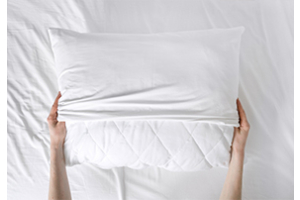The Time of Your Life and Your Time of Life

Adjusting Your Sleep To Your Time of Life.
Embracing a time of life is a practical approach to getting the very best out of our waking day. As we move through adolescence into adulthood, middle age and later life, our bodies and metabolisms change. Being in tune with those changes and adapting our lifestyles can make for a more fulfilling and rewarding life.
Over the decades, we have come to learn more and more about the important relationship between our well-being and the quality of sleep that is required to sustain it.
Sleep - strange but true.
South African sleep scientist, Dr Dale Rae, explains. “Odd as it may seem, when we sleep, our body isn’t really ‘switched off’ in the way we might imagine. It’s actively at work, restoring, repairing re-energising and readying us for the next day. Critically, in order for our bodies to maximise the benefits of healthy sleep, we need to be in a calm, relaxed state.”
There’s both a science and an art to sleep. Let’s take a closer look.
What is sleep science?
This is where Dr Rae’s extensive research and experience comes in.
“The scientific study of sleep, including sleep disorders, sleep deprivation and healthy sleep, has become an essential part of how we understand our health from a more holistic point of view. Regular exercise, however moderate, sustains our mobility. A mindful diet keeps our nutritional health in check. Add regular, high quality sleep of sufficient duration to the equation and we begin to appreciate the basics of a sustained, holistic lifestyle.”
The science tells us the nature of the good quality sleep we need, when we should ideally sleep according to our individual body clocks, and for how long we should be sleeping.
Then there’s the art of managing to integrate our adult sleep needs along with the lifestyle choices we make.
How does our time of life affect sleep?
If you’re in a blossoming new relationship as a young adult and you’ve moved in with your partner, there are some realities to ensuring you both get your beauty sleep. You may have different body clocks where one of you prefers an earlier bedtime while the other is a later sleeper. You may have different preferences in the comfort and support of your mattress. Finding your mutually compatible sleep routines may require some finessing.
As a working parent with a young family, you’ll know the obvious challenges to navigating your own sleep needs around the demands of your kids. Maintaining a connected relationship with teenagers and young adults can also have its own, special challenges. Understanding and appreciating the vital benefits of proper sleep, and especially the things that can compromise sleep, should be an ongoing discussion with a growing family. Shut down devices. Respect bedrooms as quiet, private sanctuaries. Eat healthily. And have your family be collectively aware of each other’s sleep needs.
The art of sleep is to find, as best as possible, the balance between personal and work commitments, family time, and all-important, personal downtime.
Does sleep change as we get older?
Everybody’s sleep needs differ over time. Each period of our lives may need a reassessment of our sleep patterns, in terms of what works best for us individually.
From infancy to teenage years, healthy sleep, which is longer and deeper than adult sleep, is vital to these formative years as young minds and bodies develop rapidly. Into adulthood, the number of hours of sleep shortens slightly, but the need for regular, good quality sleep still very much applies.
Here’s an indication of age ranges and recommended hours of sleep based on all the available research evidence relating to sleep duration and both physical and mental health. Everyone’s sleep needs will differ not only over their lifetime, but also over the shorter term. For example you will need more sleep when you are sick and recovering from an illness or have a higher-than-normal training load.
| Time of Life | Age | Recommended Sleep |
| Newborn | 0-3 months | 14-17 hours |
| Infant | 4-11 months | 12-15 hours |
| Toddler | 1-2 years | 11-14 hours |
| Preschool | 3-5 years | 10-13 hours |
| Primary School | 6-13 years | 9-11 hours |
| High School Teen | 14-17 years | 8-10 hours |
| Young Adult | 18-25 years | 7-9 hours |
| Adult to Middle-Age | 26-64 years | 7-9 hours |
| Late Age Adult | 65 years + | 7-8 hours |
Source: National Sleep Foundation, US
Importantly, however, sleep is not just about duration. Quality, timing and regularity are just as critical. Simply being in bed for your requisite hours, but not really getting quality sleep, is not productive.
Day after day, night after night, our bodies keep changing, just a little. We’ll likely know that we need to re-assess our sleep needs when our daytime functionality begins to suggest that we’re not getting enough or the right type of sleep. A listlessness, a difference in temperament, a niggling joint here and there, may suggest that it’s time to review our sleep routine, including the mattress we’re sleeping on. If you’re experiencing chronic sleep interruption, why not get professional advice from the Sleep Science team based in Cape Town. You can find them at www.sleepscience.co.za. Book a consultation online, wherever you happen to live and sleep.
Sleep your best life with Dial•a•Bed
Dial•a•Bed has been South Africa’s go-to sleep solution for generations. As South Africa’s largest bed brand store, you’ll find every level of support and comfort in the perfect mattress, whatever your time of life. Take a browse through www.dialabed.co.za. Explore the very latest in mattress design. From newborns to golden years, you can always trust Dial•a•Bed to keep you well-rested and energised. #SleepForLife.
TAKE CARE: Lifestyle recommendation is not medical advice. Always consult your healthcare professional should you be experiencing prolonged sleep difficulties or related health issues.






